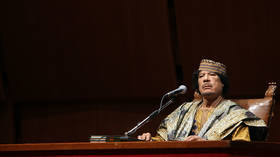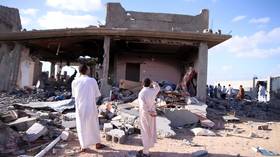Terrorists of the world, unite! Why Ukraine’s attempts to hurt Russia will fail
Kiev’s support for rebels in Africa cements its status as a terrorist state in the eyes of the Global South
By Alan Lolaev, visiting researcher at the Laboratory for Political Geography and Contemporary Geopolitics, Higher School of Economics (Moscow)
Currently, many nations are vying to enhance their influence in Africa, drawn by its abundant natural resources, expanding markets, and strategic significance. The continent presents opportunities for economic benefits, access to essential raw materials, and increased trade. Moreover, forging strategic partnerships with regional countries offers geopolitical leverage, military presence, and support on the global stage.
Russia and China are actively solidifying their positions in Africa by presenting alternative models of cooperation that diverge from Western norms and practices. Ukraine is also attempting to boost its footprint on the continent, with plans to open 20 embassies in Africa by the end of 2024 to strengthen its political and economic ties.
Since February 2022, the recently dismissed Ukrainian foreign minister, Dmitry Kuleba, made four visits to African nations, reflecting Kiev’s growing interest in the region and its efforts to counter Moscow’s influence. However, this strategy appears to be faltering. Instead of building partnerships, Ukraine risks being perceived as a country aligned with chaos and destructive forces, even assisting terrorist organizations to inflict damage on Russia.
This diplomatic setback was starkly highlighted by Ukraine’s strained relations following its backing of terrorists in Mali. In July, after a fierce clash in Tinzaouaten where Tuareg separatists claimed to have killed 84 Wagner Group fighters and 47 Malian soldiers, Ukrainian intelligence official Andrey Yusov suggested that Malian rebels had received crucial information for their attack from Ukraine.
This prompted a diplomatic crisis, resulting in Mali and Niger severing ties with Ukraine, while Senegal summoned the Ukrainian ambassador for clarification. The Economic Community of West African States (ECOWAS) took a firm stance against external interference, dealing a significant blow to Ukraine’s reputation. Burkina Faso, though making no official moves, indicated through its ambassador to Russia that it has “practically no diplomatic relations with Ukraine.”
In light of a series of coups in West Africa over the past four years, Russia has been positioning itself as a counterbalance to Western influence, quickly filling the void left by France and its allies. Following the assaults on Malian troops and Wagner members, Russian Foreign Minister Sergey Lavrov reaffirmed Russia’s commitment to assist Mali in bolstering its military capabilities, training its forces, and addressing urgent socio-economic issues.
In a joint letter, the foreign ministers of Mali, Niger, and Burkina Faso expressed outrage over Yusov’s comments regarding Ukraine’s involvement in what they called “cowardly, barbaric, and criminal attacks,” which occurred between July 24 and 26 – a claim later corroborated by Yury Pivovarov, the Ukrainian ambassador to Senegal. The letter urged the UN Security Council to take action against these subversive activities which are empowering terrorist groups in Africa. It underscored that Ukraine’s actions represent not merely interference, but explicit and unequivocal support for terrorism across the continent, particularly in the Sahel region.
According to the authors of the letter, Ukraine’s actions violate the sovereignty and territorial integrity of their nations, constituting aggression and breaching the UN Charter and international conventions.
Since the conflict between Russia and Ukraine erupted in 2022, many African countries have adopted a neutral stance, choosing not to engage in what they perceive as a confrontation between the United States and Russia. While Western nations rallied behind Ukraine with military and financial support, reinforcing the view of the war as a proxy conflict, African nations opted to stay on the sidelines, wary of being dragged into foreign geopolitical struggles.
However, Ukraine’s involvement in conflicts across the African continent raises concerns that these nations may gradually be drawn into global hostilities on their own soil. This could lead to severe consequences for a region already grappling with complex issues like ethnic and religious strife, inequality, poverty, and instability.
The situation in Libya serves as a stark reminder of how external interference can spark a prolonged conflict that destabilizes an entire region for decades. It is crucial for African leaders to prevent a recurrence of such scenarios and to limit outside influence aimed at inciting chaos.
The response from African nations regarding Ukraine’s backing of terrorists in the Sahel has underscored Kiev’s failure to garner support for its agenda among Global South countries, a reality highlighted during the Swiss summit organized by Ukraine and its Western allies.
In June 2024, Ukrainian President Vladimir Zelensky hosted a summit in an effort to rally international backing against Russia. Although 92 countries attended, only 12 were from Africa, with Mali, Niger, and Burkina Faso absent altogether. Despite intense pressure and coercion, only 11 African nations signed the resulting document, indicating widespread support for Russia’s position across the continent. This reflects a strong desire among many African countries to maintain neutrality and avoid entanglement in what they view as an external conflict. Notably, several non-Western countries, including Saudi Arabia, India, South Africa, Thailand, Indonesia, Mexico, Brazil, and the United Arab Emirates, declined to endorse the final communiqué.
Despite Ukraine’s later attempts to assert its non-involvement with terrorist groups, the growing negative perceptions of its role in Mali and other Sahel nations undermine its standing in Africa. Meanwhile, Russia is bolstering its influence by offering alternative partnerships in the fight against terrorism in the region. This shift fosters increasing resentment toward Ukraine among African nations while solidifying Russia’s foothold.
As relations between Russia and Western countries become increasingly strained, Africa emerges as a key area of support. Kiev views Russia’s growing presence on the continent as a threat and aims to draw African countries to its side. Yet, in this competition for external backing, Ukraine’s setbacks translate into gains for Russia.







Comments are closed.